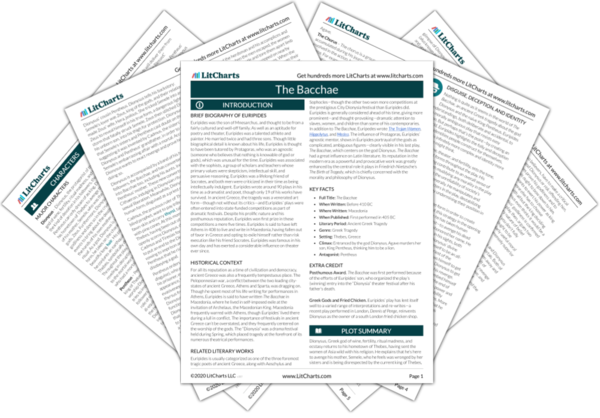The palace in Thebes initially symbolizes King Pentheus’ authority but eventually highlights his vulnerability instead. The palace is the center of Pentheus’ kingly power; it’s where he directs his kingdom according to his whims, making the decisions that govern the lives of the Theban citizens. It’s also where Pentheus gets waited on hand and foot by his servants, and accordingly represents both the administrative reach of the king and his own indulgences. Grand buildings like this are meant to be a daily reminder to the local population of who’s in charge, and make people think twice about engaging in acts of rebellion. It is, then, the most imposing visual reminder of the king’s power. That’s why it’s all the more significant that the palace has no effect on Dionysus whatsoever—in fact, he is able to set the palace on fire and bring it tumbling to the ground with ease. This emphasizes the supremacy of Dionysus’ godly powers over anything a mortal could possibly do—even if that mortal is the imposing king of a magnificent city. The palace, then, begins the play by demonstrating Pentheus’ authority; but through Dionysus’ rapid and effortless destruction, it shows the extent of Pentheus’ vulnerability, both in terms of his power and his unraveling sanity.
The Palace Quotes in The Bacchae
CHORUS
Look: the stone lintels gape from their columns!
The Roaring One is pulling down the palace from inside!
DIONYSUS
Spark the lightning bolt!
Let the flames feed on the house of Pentheus!

Unlock explanations and citation info for this and every other The Bacchae quote.
Plus so much more...
Get LitCharts A+This is maddening.
That stranger, that man I had in chains, has escaped!
What! How is it that you’re free, standing at the gates of my palace?












